-
Reasons to Improve Your Company’s Waste Management System
From recycling programs to waste audits, there are many strategies for cutting down on what your company tosses into its dumpsters in Atlanta, and there are several good reasons for you to improve your company’s waste management system .
The most obvious reason to make smart changes in the way your business manages and disposes of waste is that doing so can save you money. Additionally, by conducting a waste audit to learn what is filling your dumpsters, you can discover what types of waste and how much of each your company is producing, allowing you to make strategic changes. Also, better waste management practices mean that your company’s operations can have less of a detrimental impact on the environment, for example, by using fewer resources and producing fewer greenhouse gas emissions. Finally, making your business more environmentally friendly in this way allows you to create a greener image for your business that both your staff and customers can appreciate.

-
FAQs About Industrial Waste Management
Implementing an effective system for industrial waste management in Atlanta is important for ensuring that your company practices responsible, efficient, and environmentally-friendly waste disposal. To learn more, read on to discover the answers to common questions about industrial waste management.
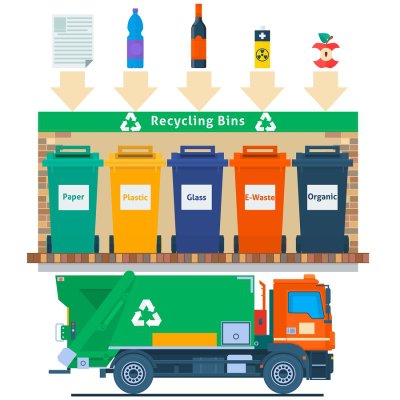
What is industrial waste?
Industrial waste refers to non-hazardous waste materials that are generated through industrial activity. Some examples of activities that produce industrial waste include construction, textile manufacturing, and automotive maintenance.
Why does industrial waste management matter?
Proper industrial waste management is important for protecting the environment and human health. Also, improving your waste management practices through recycling, zero waste initiatives, and other measures may reduce your regulatory and business expenses.
What types of sites require industrial waste management services?
Some examples of locations that typically need industrial waste management include distribution, food processing, automotive, and manufacturing facilities, as well as warehouses and appliance manufacturers.
How can I reduce my facility’s need for industrial waste management?
There are several steps that you can take to cut down on your facility’s waste management needs. For example, you can upgrade to newer technology that produces less waste, ensure proper training for your employees, maintain your facility and equipment, and implement a recycling program. Also, you can work with your waste management service to track your facility’s waste generation and identify possible areas for improvement.
What is a zero waste initiative?
A zero waste initiative is a detailed sustainability plan that industrial facilities can implement. These initiatives offer companies a number of potential benefits, such as lower material and manufacturing costs, less waste production, and reduced waste management costs. More notably, beginning a zero waste initiative can give your company a greener image, as these plans are designed to help facilities operate in a way that is environmentally responsible and sustainable. If you’re interested in beginning a zero waste initiative, then contact your waste management partner to learn about their sustainability services.
-
Spotlight on Types of Landfills
When you toss your garbage in the nearest dumpster, you may not give a second thought as to where it heads after it has been collected by a trash pickup service. In fact, there are several different kinds of landfills that serve various waste management functions. After you set up dumpster rental near Atlanta, you may want to ask your waste management professionals about the different types of landfills that are used to process your waste. To help you understand common waste management practices, here is an overview of three of the most common types of landfills.
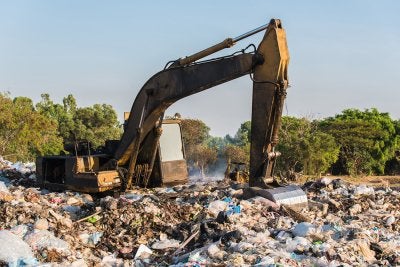
Municipal Solid Waste Landfills
Household trash and rubbish is typically sent to a Municipal Solid Waste Landfill, or MSWL. MSWLs are located across the United States, and each city, town, or county typically has its own landfill site. These landfills must be located at a safe distance away from neighborhoods and commercial districts, and they must also be equipped with liners and leech collection systems that prevent the surrounding groundwater from becoming contaminated.
Industrial Waste Landfills
An industrial waste landfill is specifically designated for the disposal of solid industrial waste products. Industrial waste landfills are engineered to safely house a variety of different types of industrial waste products, including plastic, glass, concrete, and construction debris. Along with collecting industrial waste, these landfills also serve as disposal sites for construction debris. It is important to note that hazardous waste products, such as asbestos, cannot be processed at a standard industrial waste landfill facility.
Hazardous Waste Landfills
A third type of landfill is known as a hazardous waste landfill. Since these landfills are designed to house many different types of hazardous waste, they are subject to strict regulations from the EPA. Every hazardous waste landfill must contain a double liner, runoff control system, and leak detection technology. Hazardous waste landfills are routinely inspected to make sure that they are not leaking harmful materials into the surrounding environment. If your business generates hazardous waste, you will need to make sure that your waste materials are being delivered to one of these landfills.
-
Easy Ways to Reduce Landfill Waste
We use landfills to take care of waste that we can’t recycle, but that doesn’t mean landfills are foolproof. This form of waste disposal can still harm the environment, so the practice is not quite as healthy as recycling serving Atlanta. Take a look at this video for a few easy ways to reduce landfill waste.
Recycling helps to keep waste out of landfills, but it’s not the only method you can use. When you bring your own bags to the grocery store, you won’t have to waste the bags that they offer you. If you forget your own reusable bags, ask for paper bags because they biodegrade more quickly. You should also consider printing on both sides of the sheet, and hold onto scrap paper so you can compile your scraps into a new notepad. Try to buy recycled products, and use food waste and yard trimmings for composting.
-
What Are the Benefits of Using a Compactor or Baler?
If you are looking for an efficient and eco-friendly waste management tool for your business, you may want to consider renting a compactor or baler. Compacters are unique pieces of equipment that can help you reduce the size of waste and recycled items before they are sent to the dumpster. A company that offers dumpster rental near Atlanta can help you rent or buy a compactor or baler that is the right size for the needs of your business. To highlight the advantages of renting new waste management equipment, let’s take a look at the benefits that a compactor or baler has to offer you.
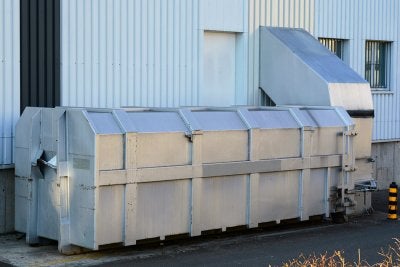
Lower Disposal Fees
As the owner or operator of a commercial business, you will need to find ways to save on your operating costs whenever possible. When you start to notice that your monthly disposal fees are higher than you would like, it may be time to use a compactor or baler. By reducing the overall size of your waste or recycling, a compactor can help you cut back on your disposal fees.
More Storage Space
Over the course of a week or month, your business may generate large volumes of solid waste. Before your waste is sent to the recycling or waste management center, it must be stored in a dumpster or another sturdy container. When you use a compactor or baler to compress your waste, you will free up additional storage space for other items that are related to your business.
Increased Recycling Revenue
When you rent a compactor for your business, you will increase your company’s potential to generate revenue through recycling. Once your recycled goods have been compacted and baled, they can easily be sent to the recycling center. Your recycling team will quickly count or weigh your baled recyclables and provide you with cash on the spot. Over time, you may find that recycling your waste, rather than throwing it in the trash, is a profitable strategy for your business.
-
Waste Management in a Senior Living Community
Like any other residential community, senior living communities must take measures to ensure that their waste management needs are met. That said, senior communities have unique considerations that can only be addressed by a select few waste management companies in Atlanta. If you are in charge of handling waste disposal for a senior living community, think about the following factors when settling on a waste management company.
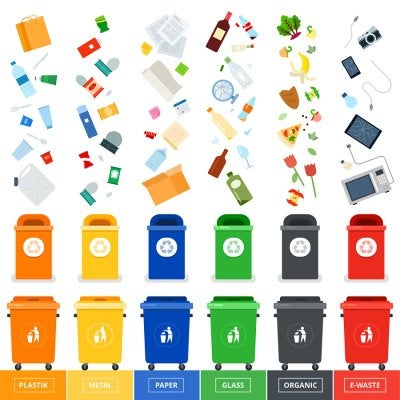
Garbage and Recycling
Dealing with day-to-day garbage is the most obvious waste management consideration for any community. Working with garbage specialists to estimate your community’s average garbage output is an important first step in determining how much dumpster space you need. Don’t forget the importance of recycling—there’s a good change that your staff and residents are throwing away items that can be recycled. Having a waste management company help with recycling can keep recyclable and compostable materials out of landfills.
Biological Waste
Senior living communities tend to have different medical needs than other communities. Some senior communities have a nursing staff to make sure seniors receive the healthcare they need to stay happy and healthy. Administering healthcare in such an environment often produces biological waste that can’t be disposed of in a normal manner. As the manager of a senior living community, you’ll need to find a company that’s qualified and equipped to handle certain types of biological waste.
Medication Disposal
Senior living communities are often targeted by criminals looking for prescription drugs. Not only can this put the members of your senior living community at risk, but it’s harmful to the surrounding community as well. It’s definitely a good idea to work with a waste management company in Atlanta to ensure that your dumpsters are properly secured, or else settle on an alternative method of disposing of medications. Enacting secure waste management practices can keep would-be criminals out of your community and your residents safe.
-
A Look at Different Types of Industrial Waste
Businesses and consumers all over the country depend on industrial plants to do the heavy lifting involved with production and manufacturing. As you can imagine, manufacturing plants produce a large amount of waste that has to go somewhere. Industries have the added challenge of ensuring that their waste doesn’t contaminate the surrounding environment. Here’s a quick look at the types of industrial waste that a waste management company in Atlanta may end up handling.
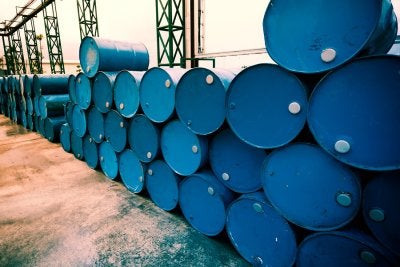
Recyclable Materials
Much of the waste produced or received by industries can be recycled. The trick is to determine exactly which items can be recycled and make sure they make it to the appropriate facilities. For instance, an industrial plant may receive thousands of boxes full of materials necessary for production. Once the contents of those boxes are removed, the boxes themselves can be recycled.
Non-Recyclable Waste
Of course, not everything can be recycled. There are many items that will need to be picked up by a waste management company and delivered to a landfill, or else reused in a more creative manner. Working with waste experts to identify the proper disposal methods for certain materials can help ensure that your plant is in compliance with the law.
Manufacturing Byproducts
Manufacturing plants are hard at work every day producing products that are shipped around the world. As you can imagine, there are also plenty of byproducts left on the facility floor. Much of the time these byproducts can be collected and reused for other industrial purposes—other times they need to be recycled or otherwise disposed of.
Hazardous Waste
Manufacturing millions of units of product can be messy business. Many industries rely on hazardous materials to create their products in a manner that is consistent with consumer expectations. However, these industries are responsible for ensuring that any hazardous materials are disposed of properly, both for the sake of their employees and the surrounding environment.
-
Methods of Industrial Waste Management
If you own a company that generates hazardous or industrial waste, it’s crucial that you think about the safest methods of waste management in Atlanta . The most effective methods of industrial waste management are ones that aim to reduce, reuse, and recycle when possible, and that are guaranteed to cause no harm to the environment. Here is a look at the best methods of industrial waste management in your area.
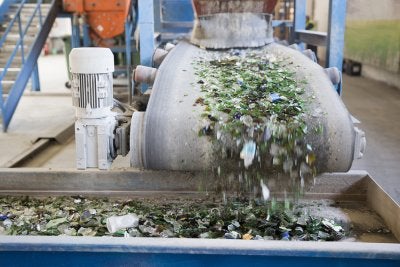
Segregation and Recycling
Much of the waste that is generated by your company’s production, shipping, and packaging needs is not reusable or compostable, but it is recyclable. The first step in your industrial waste management program is to identify which items can be recycled, and set up recycling bins or dumpsters into which they can be sorted. Most recycling centers can handle glass, paper, and plastic recycling. Many can also handle scrap metal recycling, cardboard recycling, food waste recycling, and electronics recycling. You must segregate and separate your recycling from your hazardous waste, compostable waste, and non-hazardous solid waste.
Use of Landfills
Landfills are one of the most common ways to dispose of waste in America. The only waste that should be sent to landfills is that which is non-hazardous, non-recyclable, and non-compostable. When waste is sent to a landfill, it is confined to a small area, compacted when necessary, and then buried in the earth. As the waste decomposes, it releases gases that can be converted to natural gases used for power and fuel. Landfills are cost-efficient and are designed to minimize the harm done to the environment.
Composting
The composting process turns organic waste into fertilizer that can be used to nourish plants. Most food waste can be composted, and even unsafe organic items can be turned into safe composting. You can compost food waste, leaves, newspaper, very small pieces of cardboard, straw, and sawdust. Compost is then added to soil to provide nutrients and encourage growth. Composting is one of the most effective ways to reuse and recycle waste.
-
Improving Waste Management Strategies at Your Restaurant
If you’re interested in making your restaurant greener, you should look into improving your waste management, recycling, and waste disposal in Atlanta . A comprehensive and effective waste management program is key to ensuring that you save money and protect the environment. Here are some ways that you can improve the waste management strategies at your restaurant.
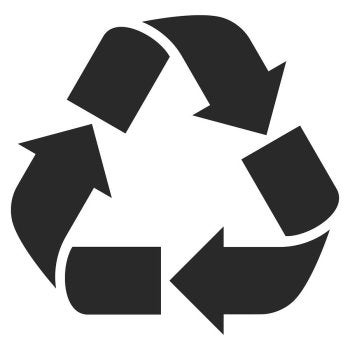
Sustainability and Zero Waste Initiatives
The best and most sustainable waste management program is one that minimizes your environmental impact while reducing your waste management and waste disposal costs. Your waste management company should focus on reducing, reusing, and recycling whenever possible. You can not only reduce the cost of your waste disposal, but also reduce the amount of waste that is generated in the first place. One of the ways that you can do this is by implementing a zero waste initiative. A zero waste initiative is a commitment to reduce the amount of waste that is sent to a landfill for waste disposal. This is achieved by investing in single-stream recycling and organics recycling.
Single-Stream Recycling
Recycling centers that offer single-stream recycling do not require companies to sort their recyclables into separate recycling bins or dumpsters before pickup. Instead, all recyclables can be put into the same recycling bin or dumpster, and they are then picked up by your waste management company and sorted at the recycling center. This makes it easier for employees and guests to participate in your restaurant’s recycling program, and it also saves the company money and labor trash removal, junk removal, and waste disposal.
Organics Recycling
One of the most voluminous types of waste that restaurants produce is organic waste, or food waste. Rather than throwing food and food byproducts away to be sent to a landfill, you can participate in your recycling center’s organics recycling program. Organic waste will be composted and then used as fertilizer and soil nutrients. Food waste that can be composted includes fruits, vegetables, meat, poultry, seafood, animal bones, shells, bakery items, eggs, paper egg cartons, milk, juice, paper juice cartons, plants, cut flowers, coffee grounds, coffee filters, tea bags, paper products, ice cream, yogurt, and cottage cheese.
-
How to Reduce Waste at Your Office
Offices typically generate quite a bit of waste in Atlanta , from paper, plastics, and glass, to food waste and electronics waste. Your local waste management company can help you develop and implement a sustainable waste management program that allows you to reduce, reuse, and recycle throughout the office. Here are some great ways that you can reduce waste at your office.

Reduce Waste Generation
You can quickly reduce the amount of waste that is generated throughout your office by reducing your reliance on paper products. Encourage employees to share information electronically, and resist printing out materials for your use or to convey information. You can also stop using cover sheets on faxes, print documents on both sides of the paper, use the copy machine less often, eliminate unnecessary forms or redesign them to use less paper, and post announcements electronically or on a central bulletin board. You can also use fewer paper products in your kitchens and bathrooms, and instead use washable, reusable products.
Reuse Valuable Materials
You can reuse valuable materials, like paper, throughout the office. Paper only has printing or writing on one side can be reused as scratch paper. File folders, internal envelopes, binders, packaging materials, and other office supplies can be shared and reused throughout the office. You can also donate items that can’t be used again within the office to other charities or organizations so that they won’t end up as waste.
Recycle and Compost When Possible
Your local recycling center can provide you with valuable recycling facts and can inform you as to which items are recyclable and compostable. Most recycling centers can process paper recycling, glass recycling, cardboard recycling, and plastic recycling. Some can also manage scrap metal recycling and electronics recycling. Do not dump or throw away any office item that can be safely recycled. Place recycling bins throughout the office, and arrange for your waste management company to pick up your recycling when they do your trash pickup. Most food waste can also be composted and used for fertilizer. Find out if your office generates food waste that is compostable, and ask your recycling center or waste management company about composting.
RECENT POSTS
categories
- Uncategorized
- Waste Management Atlanta
- Waste Disposal and Recycling
- Hazardous Waste Disposal
- Chemical waste removal
- solid waste removal
- R3 Program
- Sustainable Organizations
- Sustainable Waste Removal
- Commercial Waste Removal
- Materials Management Program
- Dumpster Rental
- Roll Off Dumpsters
- Construction Site Waste Removal
- Sustainability
- Recycling in Atlanta
- Industrial Recycling
- Industrial Waste Removal Services
- Southern Waste & Recycling
- Waste Removal Atlanta
- Waste Specialists
- Atlanta
- Infographic
- Front Load Dumpsters
- Rear Load Dumpsters
- Reusable Electronics
- Dump Truck Atlanta
- Recyclable Electronics
- Trash Compactors
- Recycling
- Recycling Program
- Office Recycling
- Metal Recycle
- Electronic Waste
